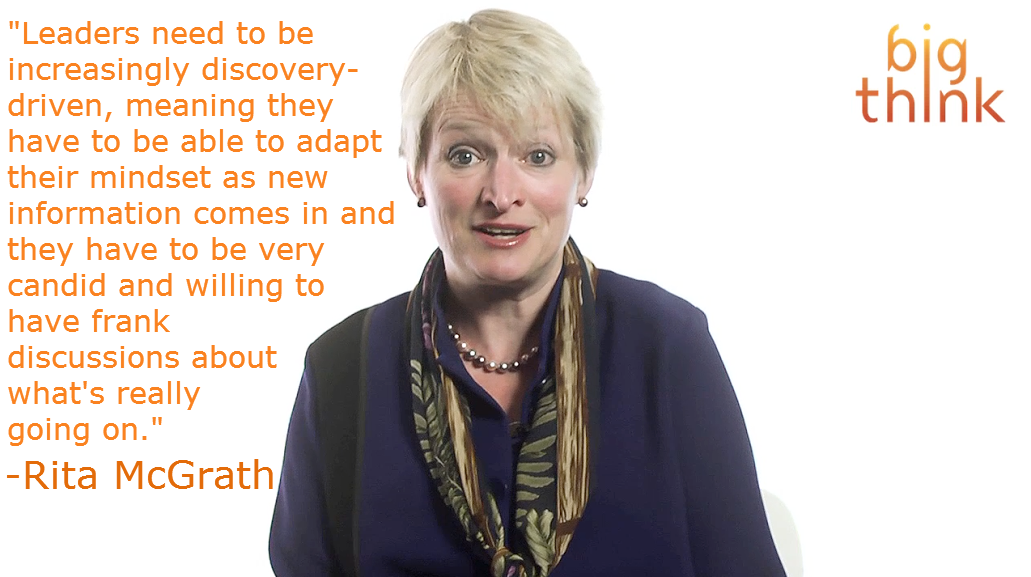Rita McGrath argues that traditional business strategy, focused on stability and sustainability, should be eschewed. Rather, she says, businesses should fine tune their strategy to cultivate a transient competitive advantage. McGrath is a Professor of Management at Columbia Business School.
Rita McGrath: Well, the core theme of transient advantage, as I like to refer to it, is a departure from the traditional view in strategy. That what you wanted to create was what was called a sustainable competitive advantage. And the classical idea was that you found an attractive position within an industry, threw up entry barriers like crazy and then you defended that position against competition. And as I've worked with companies, as I've worked around the world, what became pretty clear was that traditional view of strategy was not only not really well reflected in what was going on, but that it was actually dangerous; that it causes companies to do a lot of stupid things. Like focus excessively on your competition rather than really thinking about your customer. Focus excessively on your industry rather than thinking really about the arenas in which you're competing. And most dangerous of all focus on stability when what you need to really be thinking about is change in dynamism. So the book, The End of Competitive Advantage was really meant to begin a conversation about what strategy looks like today for more and more of our companies.
Well, I think the idea of sustainable competitive advantage really got entrenched in the strategy lexicon in the 1960s and '70s, in the U.S. primarily. And if you think about those times, if you go back in time to when those concepts were first developed, you know, India was shut, China was shut, most of Eastern Europe was behind the Iron Curtain. We didn't have competition in markets from the U.S.S.R. So if you think about it, American companies had a pretty big period of stability in which they got to compete. And so the essence of competition back then was really about the classics right, scale, scope, comparative advantage, optimization, running efficiently, because that's what got you the real edge because you didn't have global competition, you didn't have the Internet, you didn't have digitalization, you didn't have some kid in a garage able to invent something that four weeks later is worth a billion dollars. I mean you just didn't have those phenomenon.
So I think what we have clung to in strategy is this notion of sustainable advantage for a lot of reasons. It was very traditional. It worked very well. And the other big secret I think behind this notion of sustainable advantage is there are a lot of analytical tools that go along with it. So relative position in an industry, relative market shares reflected in the well-known Boston consulting group Matrix. There's a lot of analytical tools. And for an MBA type audience, analytical tools have a real attractiveness to them. So instead here I am saying, well, analysis of the past doesn't really help you and you can't really do industry comparisons and come up very much that's useful, in fact you can't analyze your way to a competitive advantage at all and that seems a little destabilizing. So I think people like to cling to what's familiar, they like to cling to the tools and concepts that they know best. And that's why I think it's been such a durable idea.
What's interesting also is the reaction that I've gotten to the book. So the reaction to the book kind of falls in three buckets. So the first bucket is people who go oh no it doesn't apply to me. It doesn't apply to me at all. Not part of my industry; this just isn't my reality. The second bucket is people who panic, you know, they just try to change everything all at once they go sprouting off in all directions and usually that doesn't go very well. And the third bucket is people who go okay, well if that's the way the world is working today, kind of a sigh of relief yes this maps onto my reality much better than these other concepts, now I can think about that and start to get on with it. And so I think that third category are going to do a lot better in these transient advantage scenarios than the first two.
So, I'm often asked okay what's really different about strategy today than the way that we've traditionally thought of it? And I develop what I call a new playbook for strategy, which consists of six fundamental building blocks you can think of. The first one is to continuously reconfigure what you're doing rather than depending on a huge seismic change that involves massive restructuring and downsizing. The second is getting much better at disengagement, being able to stop activities that are no longer relevant or stop ventures that you started that just aren't panning out the way that you had hoped. The third is getting a firm handle on your resource allocation process, because what often happens in companies is powerful people running core businesses get to call the shots with regards to where the resources get spent. And if you want to know how that ends up just look at BlackBerry or Nokia or any of those firms where powerful people tried to defend their advantages far longer than they should have.
The fourth is innovation. And I argue that innovation has to become a proficiency. It can't just be episodic; it can't just be something we do once in a while. This also has pretty profound implications for leaders. I think leaders need to be increasingly discovery driven, meaning they have to be able to adapt their mindset as new information comes in and they have to be very candid and willing to have frank discussions about what's really going on. Lastly, I think all of this has huge implications for individuals and how we structure our jobs, how we structure our careers, what we do both as employers and as persons who are working ourselves. And I think the traditional career path for a whole lot of people is going to be radically different than anything we seen before. So if you put all this together, what it amounts to is a set of practices, which are not unheard of but which I think very few firms today have really embraced.
Directed / Produced by Jonathan Fowler and Dillon Fitton





